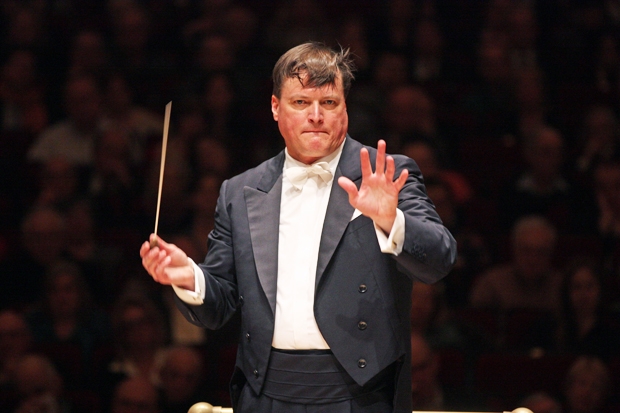The morning after the Berlin Philharmonic Orchestra failed to elect a music director, I took a call from Bild-Zeitung, Berlin’s most popular tabloid, seeking analysis. Later, they asked me to write a full-page op-ed.
Now shut your eyes a moment and try to imagine any circumstance in which the Sun would ever shine an inch of space on an orchestral conductor — unless, of course, he or she was snapped pants down by paparazzi in an M4 layby. Nothing will ever convince British tabloids to overcome their class-based scorn for art and, while we may think of German media as less counter-elitist, Bild readers consume no more Beethoven per head than Sun browsers. So why the sudden interest?
Because, for Germans, this is existential. In Germany, culture defines nation. In Britain, it defines nothing. Angela Merkel likes to be seen enjoying herself at symphony concerts and, every summer, at Bayreuth. David Cameron would not know how to chillax at a Britten opera, or when to clap.
The intense focus on the Berlin Philharmonic election was triggered by the emergence of a German candidate as music director, the first since Wilhelm Furtwängler in 1922 (Furtwängler’s 1955 successor, Herbert von Karajan, was a fly-in Austrian who overnighted at the Kempinski Hotel).
The German of 2015 — hailed by some as a man of destiny — is Christian Thielemann, Berlin born and bred, German as bratwurst in a bierkeller. German, and then some.
Thielemann, 56, is a musical conservative who shuns atonality and pretty much anything written after the death of Richard Strauss. His outlook is resolutely retro. He likes saying that Germans have nothing to apologise for, a coded phrase that places him on the outer fringe of the democratic right. In January, he issued a diatribe that appeared to show support for the Pegida anti-immigrant movement. A loner, never married, aloof and uncollegial, Thielemann is a powerful if conventional interpreter of Beethoven, Brahms and Bruckner, a trusted crucible of the national heritage. Germans saw his Berlin election as being as inevitable as the hung Parliament predicted by British pollsters.
Within the orchestra, Thielemann had a powerful body of support. Two players who look after business affairs, Peter Riegelbauer and Olaf Maninger, argued that he sold better at Salzburg and other high places than any other candidate. He was the man to restore Karajan-era prosperity. The older Philharmoniker assented wistfully.
Faced with the inexorability of his election, alternative candidates melted away. Gustavo Dudamel and Yannick Nézet-Séguin swiftly extended their contracts in Los Angeles and Philadelphia. Daniel Barenboim and Mariss Jansons, two well-liked seniorities, withdrew days before the election.
That left one man standing. Andris Nelsons, a Latvian 20 years Thielemann’s junior, is a wunderkind who conducted his first Ring aged 26 and recently upgraded from Birmingham to become music director of the Boston Symphony Orchestra. Technically brilliant, convivial over a few beers, the first conductor ever to take paternity leave when his daughter was born, Nelsons has an open countenance, irresistible charisma and a 21st-century cosmopolitanism that befits Berlin’s multicultural self-image.
At ten in the morning of Monday, 11 May, 123 musicians of the Berlin Philharmonic trooped into a church in the south-west suburb of Dahlem and surrendered their phones at the door. What happened inside is secret (sort of), but after Thielemann’s bloc failed to clinch it on the first ballot, support swung one way and the other throughout the day until, after 11 and a half hours, the players emerged exhausted and defeated. They had failed to resolve a discordance.
Chairman Riegelbauer put a brave face on things, saying they still had a year to decide. But battle lines have been drawn and trenches dug. It is hard to see how enough players can be swayed from Thielemann to Nelsons or vice versa in order for the orchestra to bury its differences and rally around a new music director.
That leaves three options, none of them easy. The players could call in a compromise chief, a favourite being the Italian Riccardo Chailly, 62, music director of the Leipzig Gewandhaus and La Scala, Milan. But no one likes to be seen as second or third best in any contest and a man of Chailly’s accomplishments and pride may not want to run his head into a Berlin Wall.
The second option is for one side to surrender. Since Thielemann’s supporters show no sign of weakening that would mean a scuttling of the Nelsons fleet, followed by an exodus of fine players and a narrowing of the orchestra’s offer, which would not be good for overseas trade.
The third solution, which I emblazoned in Bild-Zeitung, is a joint music directorship in which Thielemann plays the three Bs and the home market while Nelsons looks to the future and the rest of the world. Two music directors? That’s never been tried in Berlin, although Amsterdam and Stockholm have managed it. Riegelbauer, choking on his breakfast Bild, shouted it down as being against the rules, but the Philharmoniker is now in uncharted waters, unable to play off the same score or see a safe haven. Scary times demand extraordinary measures. Two batons may be better than one. The idea has obvious appeal to Chancellor Merkel, who always seeks a grand coalition.






Comments